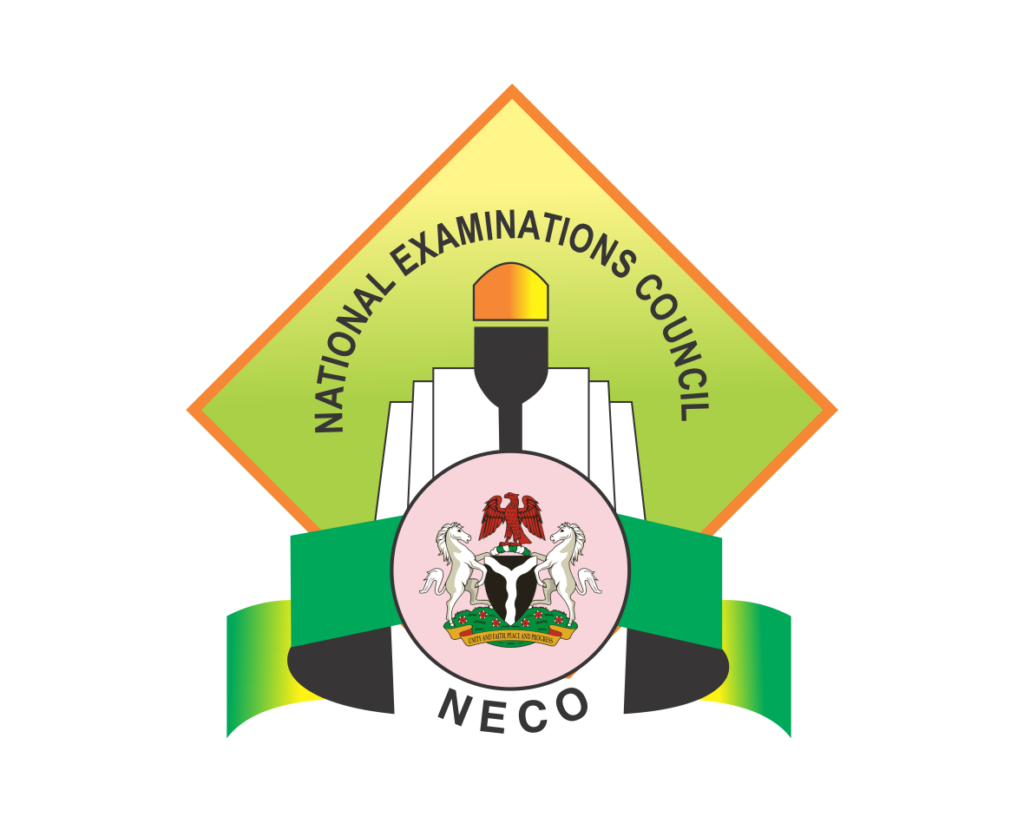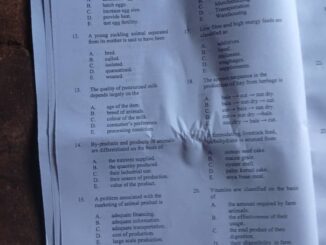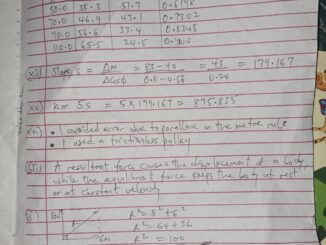Welcome to “Naijaclass Academy” For Neco 2024 Civic Education Answer (June/July Exam)

Wednesday, 3rd July 2024
Civic Education (Objective & Essay) 2:00pm – 5:00pm
——————————
*CIVIC EDUCATION*
01-10: DCDDDBAEAA
11-20: DCBCDBCADE
21-30: BBECBDCEBB
31-40: DECAAECCCD
41-50: ADAAEABDAA
51-60: BCCEEEEBEB
=========
COMPLETED
====================
*CIVIC EDUCATION THEORY ANSWERS*
ANSWER TWO(2) QUESTIONS FROM EACH SECTION
*SECTION A; ANSWER TWO(2) QUESTIONS ONLY*
(1a) Youth empowerment refers to the process of enabling young people to acquire the skills, knowledge, and confidence necessary to become active participants in their personal and community development.
(1b) (i) Education and Skills Development: Providing access to quality education, vocational training, and skill-building programs that prepare youths for employment, entrepreneurship, and leadership roles. This enables them to acquire the necessary tools to succeed in their chosen paths.
(ii) Mentorship and Guidance: Pairing youths with positive role models, mentors, and coaches who offer guidance, support, and encouragement. This helps them develop a sense of purpose, build self-esteem, and navigate life’s challenges.
(iii) Leadership Opportunities and Decision-Making: Offering youths opportunities to take on leadership roles, participate in decision-making processes, and engage in community service. This empowers them to develop leadership skills, build confidence, and become active contributors to their communities.
(iv) Access to Resources and Funding: Providing youths with access to resources, funding, and networks that support their ideas, innovations, and entrepreneurial ventures. This enables them to turn their passions into reality, become financially independent, and create positive impact in their communities.
===================================
(2a) Community service refers to voluntary work done by individuals or groups to benefit their community, neighborhood, or society at large.
(2b) (i) Personal Growth and Development: Community service provides opportunities for individuals to develop new skills, build confidence, and gain valuable experience. It helps them discover their passions, values, and strengths, leading to personal growth and self-improvement.
(ii) Social Connections and Networking: Community service brings people together, fostering social connections and relationships with like-minded individuals. It provides opportunities to meet new people, build networks, and develop a sense of community and belonging.
(iii) Improved Mental and Physical Health: Engaging in community service has been shown to have numerous physical and mental health benefits, including reduced stress, improved mood, and increased overall well-being. It also provides opportunities for physical activity, outdoor work, and healthy habits.
(iv) Civic Engagement and Social Responsibility: Community service instills a sense of civic engagement and social responsibility, encouraging individuals to become active citizens and contribute to the betterment of their community. It helps build a sense of ownership and accountability, promoting a more engaged and compassionate society.
===================================
(3a) Democracy is a form of government where power is held by the people, either directly or through elected representatives.
(3b) (i) Free and Fair Elections: Citizens elect their representatives through a free and fair process, ensuring that the will of the people is reflected in the government. This means that elections are conducted without fraud, intimidation, or manipulation.
(ii) Representation: Citizens elect representatives to make decisions on their behalf. These representatives are accountable to the people and are expected to represent their constituents’ interests in the government.
(iii) Separation of Powers: A system of checks and balances is in place to prevent any one branch of government (legislative, executive, or judicial) from abusing its power. This ensures that power is distributed evenly and that no single branch dominates the others.
(iv) Accountability: Government officials and representatives are accountable to the people. They are responsible for their actions and must answer to the citizens who elected them. This is achieved through various mechanisms, such as regular elections, public scrutiny, and institutional checks.
===================================
(4a) Cultism refers to the practices and activities associated with cults, which are secretive and often involve rituals and extreme loyalty to a particular group. Cults may engage in illegal or harmful activities, and their members often exhibit blind obedience to their leaders.
(4b) (i) Pyrates Confraternity
(ii) Vikings Confraternity
(iii) Black Axe Confraternity
(iv) Buccaneers Confraternity
(v) Klansmen Konfraternity
(vi) Supreme Eiye Confraternity
(4c) (i) Peer Pressure and Social Status: Many students join cults to gain a sense of belonging, prestige, and respect from their peers. Cult membership is often seen as a symbol of power, strength, and influence.
(ii) Protection and Security: Some students join cults for protection and security, especially in environments where violence and intimidation are common. Cults often provide a sense of safety and support for their members.
(iii) Financial Benefits and Material Gains: Cults often engage in illegal activities, such as extortion, robbery, and fraud. Students may join cults to gain access to financial resources, material possessions, and other benefits.
===================================
SECTION B; ANSWER TWO(2) QUESTIONS ONLY
(5a) (i) Education: Incorporate national history, culture, and values into school curricula to instill a sense of national identity and pride in citizens from a young age.
(ii) Media: Utilize media outlets to promote nationalistic content, such as documentaries, films, and programs that showcase the country’s achievements and heritage.
(iii) National Symbols: Display and explain the significance of national symbols like flags, anthems, and emblems to foster a sense of unity and shared identity.
(iv) Cultural Events: Organize cultural festivals, celebrations, and exhibitions to showcase the country’s diverse heritage and promote cross-cultural understanding.
(v) National Service: Implement national service programs that bring citizens together to work on projects that benefit the country, fostering a sense of shared responsibility and patriotism.
(vi) Leadership: Encourage leaders to promote national consciousness through their speeches, actions, and policies, setting a positive example for citizens to follow.
(5b) (I)Preservation of Heritage: National institutions like museums, archives, and libraries help preserve a nation’s history, culture, and traditions for future generations.
(II) Promotion of Unity: National institutions like national theaters, festivals, and events bring citizens together, promoting a sense of shared identity and unity.
(III) Development and Progress: National institutions like research centers, academies, and think tanks drive innovation, research, and development, contributing to a nation’s progress and prosperity.
===================================
(6a) Fundamental human rights are basic rights and freedoms that are inherent to all human beings, regardless of their race, gender, nationality, or status. These rights are universal, inalienable, and indispensable for the dignity and well-being of individuals.
(6b) (i) Civil and Political Rights: These rights include freedom of speech, assembly, association, and movement. They also include the right to life, liberty, and security of person, as well as freedom from discrimination and equality before the law.
(ii) Economic, Social, and Cultural Rights: These rights include the right to education, healthcare, housing, and social security. They also include the right to work, fair wages, and safe working conditions.
(iii) Environmental and Developmental Rights: These rights include the right to a clean and healthy environment, as well as the right to development and improvement of one’s quality of life.
(6c) (i) Physical Harm: Human rights abuse can result in physical harm, injury, or even death.
(ii) Psychological Trauma: Victims of human rights abuse may suffer from psychological trauma, including anxiety, depression, and post-traumatic stress disorder (PTSD).
(iii) Displacement and Migration: Human rights abuse can lead to displacement and migration, as individuals and communities flee from persecution or violence.
(iv) Social and Economic Instability: Human rights abuse can lead to social and economic instability, as individuals and communities are denied their rights and opportunities.
(v) Lack of Trust and Social Cohesion: Human rights abuse can erode trust in government and institutions, leading to social unrest and division.
(vi) Underdevelopment and Poverty: Human rights abuse can perpetuate underdevelopment and poverty, as individuals and communities are denied their rights and opportunities.
===================================
(7a) (i) Honesty:
Honesty is the quality of being truthful and transparent in one’s actions and words. It involves integrity and a commitment to being fair and just. Honest individuals are trusted and respected in society, and honesty is crucial for building and maintaining relationships.
(ii) Cooperation:
Cooperation is the act of working together towards a common goal. It involves collaboration, teamwork, and mutual support to achieve shared objectives. Cooperation is essential in various settings, including workplaces, communities, and families, as it fosters harmony and efficiency.
(iii) Self-reliance:
Self-reliance is the ability to depend on oneself and one’s own resources. It involves independence, self-sufficiency, and confidence in one’s abilities. Self-reliant individuals can solve their problems and make decisions without excessive dependence on others.
(7b) (i) Informed Citizens:
To educate individuals about their rights, responsibilities, and the workings of their government. Informed citizens are aware of their civic duties and the importance of participating in the democratic process.
(ii) Active Participation:
To encourage active participation in civic and political processes. Citizenship education motivates individuals to engage in activities such as voting, community service, and advocacy.
(iii) Social Cohesion:
To promote social cohesion and understanding among diverse groups within the nation. Citizenship education fosters respect for diversity and encourages unity and cooperation among different communities.
===================================
(8a) Drug abuse refers to the excessive and harmful use of drugs, including illicit drugs, prescription medications, and over-the-counter substances.
(8b) (i) Taking larger doses than prescribed: This includes taking more pills or tablets than directed, or using more of a substance than recommended by a doctor. This can lead to overdose and increase the risk of adverse effects.
(ii) Using drugs for non-medical purposes: This involves using drugs to get high, cope with stress, or for recreational purposes. This can lead to addiction and neglect of important responsibilities and relationships.
(iii) Using drugs without a prescription: This includes taking prescription medications that are not prescribed to you, or using someone else’s prescription. This can be dangerous, as you may not know the proper dosage or potential interactions with other medications.
(iv) Combining drugs with other substances: This includes mixing drugs with alcohol, other medications, or illicit substances. This can increase the risk of adverse effects, overdose, and addiction, and can also lead to unpredictable and dangerous interactions.
===================================
COMPLETED





plseas i need civic education question and answer for 2024 neco exam
Please i need Civic answer for tomorrow
Please I need a civic education answer
For neco 2024
ok is not yet out now
if u need the answer u will need to pay 1k
EXACTLY
civic education answers are out
Even me
That’s good
I need it
I need cigarettes
i need civic exam neco for 2024 by tomorrow morning
by the god grace we can pass the exam of 2024 amen
I WANT U TO HELP ME WITH CIVIC EDUCATION ANSWERS
I need physics questions and answers
plseas i need civic education question and answer for 2024 neco exam
Please i need Civic answer for tomorrow
I objective and essay for civil education
I’m interested
Please I need a civic education answer
For neco 2024
I need answer of civic education neco
ok is not yet out now
if u need the answer u will need to pay 1k
EXACTLY
civic education answers are out
Pls have being chatting on whatsapp no body reply me. can i pay and get the answer here now?
Dear Mutiyat,
we are so sorry for the delay, the number of chat we attended to is much more than ever before.. Our Admin are active Online attending to every chat.
Kindly make your payment and send your screenshot to us on WhatsApp. You will get response as soon as possible.
Best Regard,
Princess Ife
Naijaclass Academy Moderator
Even me
That’s good
I need it
I need cigarettes
i need civic exam neco for 2024 by tomorrow morning
by the god grace we can pass the exam of 2024 amen
Me also
I WANT U TO HELP ME WITH CIVIC EDUCATION ANSWERS
I need physics questions and answers
please please I need for tomorrow
I need it
I need it
Me too i need civic education question and answer
Me too i need civic education question and answer
i need civic exam neco for 2024 by tomorrow morning
i need civic exam neco for 2024 by tomorrow morning
Please I need civic education question and answer
Please I need civic education question and answer
THANK YOU
THANK YOU
I need civic education questions and answers for 2024 neco exam
Please who have the code
Civic answer
I need civic
I need civic expo
I need answers for Civic education
Pls i need civic education question and answers for neco today ple
I need civic objective
Hi greetings everyone please I need civic education objective & essay
I need civic objective
Drop obj questions and i will make transactions
civic answer
civic answer
i need civic objetive and essay
aliu
I NEED GOVT QUESTION AND ANSWER
I need answer